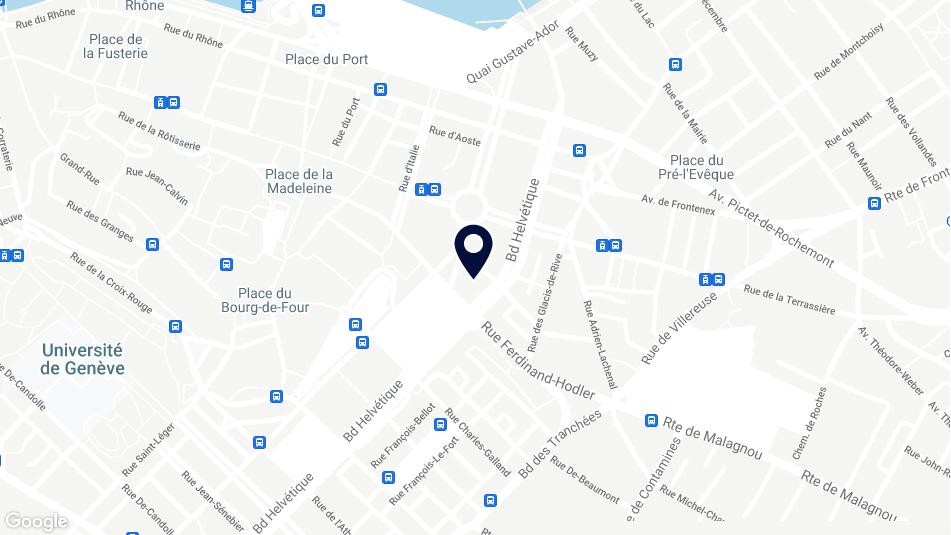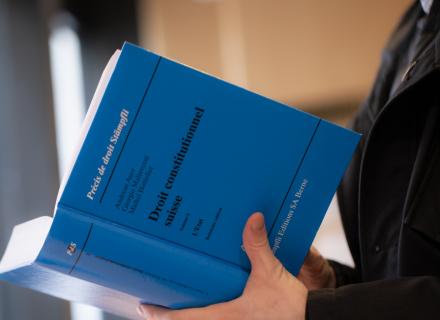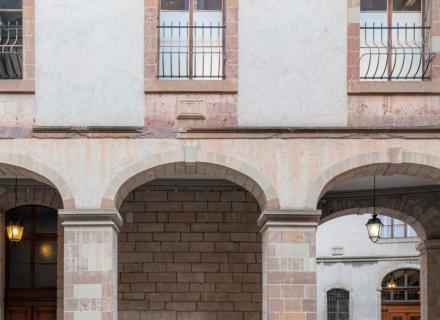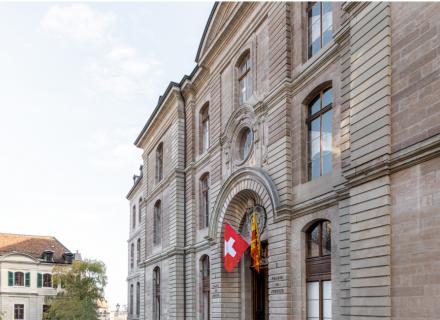Contacts
Address
Contact details
Desk
Opening hours
8h30-12h / afternoon closed
Mailing address
Tribunal administratif de première instance
Case postale 3888
1211 Genève 3
Presidency and Directorate
-

Mr. Olivier BINDSCHEDLER TORNARE
President
-

Mrs. Mina-Claire Prigioni
Director
Competences
The Tribunal administratif de première instance rules on appeals in the following areas:
- Fiscal law (direct federal tax, advance tax, cantonal and communal taxes, tax remission).
- Foreign nationals law (stay and residency, work permits, administrative detention).
- Environment and constructions law (building and demolition permits, sale and transformation of flats, fines for depositing waste on the public road).
- Road traffic law (withdrawal of driving or circulation licences, road signs and signals).
- Procedure to remove people in the context of domestic violence (decision to remove a person from the marital home and application for an extension of the removal).
- Supplemental insurance to compulsory accident insurance (including a payment claim by an insured against his/her insurer).
- Expropriation in the public interest by the Canton or a municipality (claim for compensation in case of expropriation).
- Conflicts relating to equality between women and men in labour relations in public law. In this field, the court only intervenes as a conciliation authority.
The Tribunal administratif de première instance does not provide legal advice.
Organization
The Tribunal administratif de première instance is composed of 6 tenured judges, 2 of whom are part-time judges, and 5 deputy judges.
It also includes 44 assessor judges specialised in fiscal law, environment and constructions law, as well as in terms of expropriation.
The tenured judges are career magistrates, which is not the case for deputy judges and assessors.
The mission of the deputy judges is to replace a career magistrate when necessary.
Assessor judges are specialists who provide technical advice to the tenured or deputy judges. They take a full part in the judgments issued by the court.
In matters relating to the law on foreign nationals, road traffic, removal procedures and supplemental insurance to compulsory accident insurance, the court decides without assessors with a single judge panel.
Proceeding
Your actions in brief
You do not agree with an administrative decision which designates the Tribunal administratif de première instance as an appeal authority in one of its areas of competence.
The procedure is as follows:
Step1: bring an action before the court
You must draw up your appeal in writing, in French, and send it to the Tribunal administratif de première instance by post or by depositing it directly at the desk of the court or the Greffe universel.
Your appeal should imperatively:
- Refer to the administrative decision you are contesting
- Specify the facts and arguments (the grounds) in support of your appeal
- Indicate what you wish to achieve (your conclusions)
- Attach all relevant documents, including the contested decision, in support of your appeal
Step2: pay an advance on the cost
On receipt of your appeal, the court will ask you to pay an advance on the cost. Failure to pay this advance within the time limit set by the court will result in the inadmissibility of your appeal.
At the end of the proceedings, the court will rule on all the costs of the proceedings, which are in principle borne by the party losing the case.
If you do not have enough resources to defend your interests in court, you can apply for legal aid.
Step3: conduct the proceedings
The court will ask the authority which has issued the contested decision to forward the file and to reply to the arguments submitted in your notice of appeal.
The court investigates the proceedings in order to gather all the elements necessary to rule on the dispute (in particular hearings of the parties/witnesses, transports in situ, written communications, expert opinions).
Step 4: notice of the judgment
At the end of the proceedings, the court issues its judgment, which is sent to you by registered mail.
Application forms
You will find below, the necessary forms and indications for obtaining an attestation of non-appeal and for requesting the registration in the list of court appointed lawyers in respect of compulsory measures.
Questions/answers
Your appeal must imperatively contain, under penalty of inadmissibility (art. 65 LPA):
- The challenged decision
- The considerations (arguments) in support of the appeal
- Your conclusions (what you request)
It is written in French, dated and signed by you or your representative.
You can validly address your appeal to the court:
- By post
- By depositing it at the court desk, during opening hours or by depositing it at the Greffe universel
An appeal sent by e-mail to the Tribunal administratif de première instance, is not admitted.
The appeal and its documents are sent or filed with the court in as many copies as there are parties to the proceedings, plus one copy for the court.
The time limit for appeal is set by the law. In the majority of cases, the deadline for appeal is 30 days. To determine the time limit for taking action, you should refer to the decision you intend to contest, which normally includes the time limit for appeal and the designation of the competent court.
The period runs from the day following the notification of the decision.
If the appeal is not lodged within the appeal period at the desk of a Swiss post office or the court, the appeal will be declared inadmissible.
You can act in person before the court, except in matters of compulsory measures. You may also be represented by a lawyer or by another professionally qualified representative, or even by your spouse, registered partner, an adult ascendant or descendant.
If your case is complex, you should be assisted by a professional.
The initiation of proceedings before the court requires the payment of an advance on costs. You are required to pay an advance on costs within 30 days. The amount is generally between Fr. 500.- and Fr. 900.-.
Please note that the request for an advance payment is sent to you by registered mail. If you do not pay the advance payment within the time limit, the appeal is declared inadmissible.
At the end of the proceedings, the court shall decide on the costs of the proceedings, including the fate of advance payment.
In practice, the court refrains from requiring the payment advance on costs in the following fields: compulsory measures, removal measures (domestic violence), supplemental insurance to compulsory accident insurance and expropriation.
If you do not have sufficient resources to defend your interests in court, you can apply for legal aid. This financial aid, granted under certain conditions, consists mainly of partial or total coverage of legal costs, including an advance payment on costs, and/or lawyer's or representative's fees. It is not free of charge: you will have to reimburse it as soon as you are in a position to do so.
You can consult your file at any time. To do so, all you need to do is contact the court desk so that your file can be made available to you for consultation.
When an appeal is lodged with the court, it is immediately assigned to one of the judges of the court of which the chamber’s number appears in every correspondence.
The judge sets a time limit for the authority which issued the decision to forward its case file and reply to the arguments presented by the appellant in his or her appeal.
Further exchanges of written submissions may take place.
The court conducts the proceedings in order to gather all the elements necessary to rule on the dispute (in particular hearings of the parties/witnesses, on site visit, written information, expert opinions).
When the court deems that it has all the elements necessary to rule on the dispute, the case is held to be judged. The court then renders its judgment which is notified to the parties. At the end of the judgment, the court decides on the proceeding's costs which are usually charged to the party losing the case.
You can be represented by a lawyer or a representative during the proceedings, unless your appearance has been ordered by the judge.
In this case, you must appear in person; to be heard, legal entities appoint a natural person authorised to represent them and who has personal knowledge of the facts at the origin of or in connection with the dispute.
The duration of a proceeding depends on many factors (complexity of the case, necessity and duration of the investigation). It is therefore not possible to give you a general indication of how long it will take for a judgment to be issued.
There is a charge for the proceedings, except in cases of administrative detention, compulsory accident insurance and expropriation. When the court renders its decision at the end of the proceedings, it decides on the costs of the proceedings, which are usually charged to the party who loses the case. If the appellant is successful, the advance on costs is normally reimbursed.
The costs of the proceedings include the fees (the fees charged in return for the court's intervention) and the outlays (the fees of experts, interpreters and translators, travel and attendance allowances and other expenses necessitated by the proceeding).
The judicial fee is set by the court according to the complexity of the case and the investigative and procedural acts carried out.
The court may award the party having wholly or partly succeeded in the action, a compensation for the indispensable costs caused by the action. The compensation is not awarded systematically, you must expressly request it. In principle, this compensation is charged to the party who has lost the case.
Yes, unless the court orders the hearing to be held in camera.







